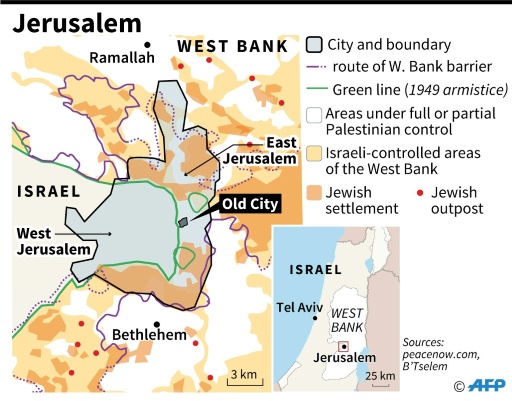On December 6th, President Donald J. Trump made the historic decision to upend close to seven decades of U.S. foreign policy by formally recognizing Jerusalem as the capital of Israel. The decision bought Mr. Trump some applause and political capital among the Christian Right, from Jewish organizations like B’nai B’rith International, from the American Jewish Committee, and garnered the usual amount of ardent fury from many Middle Eastern and European leaders.
However, the decision’s impact is being felt most acutely by politicians within Israel and the Palestinian Territories, where overnight it has created an even more complicated political reality to navigate — rewarding extremists on both sides and hedging out the moderates.
First the Israeli side: While Mr. Trump’s decision has been near universally lauded across the spectrum by Israeli Jewish politicians, it has also caused some new stress. For the Zionist Right, the decision represents the realization of their dreams of territorial expansion. Prime Minister Benjamin Netanyahu met the announcement with talk of historic continuity and Jewish identity, but the change in U.S. policy does create a difficult balancing act for him in terms of foreign policy.
To heed Mr. Trump’s caveat that the decision does not constitute a U.S. position on “specific boundaries of the Israeli sovereignty in Jerusalem” (i.e. it did not rule out a future U.S.-endorsed decision on the division of the city in a peace deal), Mr. Netanyahu has to be careful in the level of encouragement he provides to the Jewish right-wing settler movement, the backbone of his party, in their ferment for territorial expansion. He again risks being outmaneuvered in his rhetoric by the growing far right, represented by Naftali Bennett of the Jewish Home Party, who has long argued that the Jewish claim to the whole of Jerusalem.
The decision puts the Zionist left, represented by the Labor party, in a much more difficult position, hitting on a fundamental contradiction at the heart of their political platform. Labor has long supported a two-state solution to the Israeli Palestinian conflict. As a result, Labor party head Avi Gabbay greeted the announcement by delicately trying to forge a middle road on what is arguably a zero-sum issue. Praising the decision, he cautiously raised the need for trust building and options for “resuscitating” peace, using the historic moment to call for an end to Jewish settlements and for transfers to facilitate Palestinian control over swaths of the West Bank.
The U.S. decision on Jerusalem as the capital of Israel also further compounds the complicated Palestinian political landscape. With East Jerusalem long held as the capital and cornerstone of any future Palestinian state, the decision has been met by some Palestinians as spelling the end of any negotiated solution to the conflict.
This places Palestinian president, Mahmoud Abbas, yet again, in an untenable situation. Squeezed between his role as the internationally recognized representative of the Palestinian cause, and the demands of the Palestinian street, he has said that the decision effectively ends his role as mediator in the conflict.
Largely powerless to quell the rising tide of Palestinian protest swelling from within the West Bank and Gaza over the last days, Mr. Abbas and the Palestinian Authority are the clear losers in this situation. The winner, predictably, is the Palestinian Hamas, who in a press release warned of “very severe repercussions in Palestine, the Arab world, and the Islamic arena.”
Boosted in their mass appeal as champions of resistance to Israel, Hamas has long argued for an end to any negotiation process as a means of achieving Palestinian statehood. Building upon rising sentiments, Hamas has called on Friday for a Day of Rage, urging Palestinians to reject the decision by taking up a new Intifada, a civil uprising that can only be realized by the people themselves.
Last, what effect does Mr. Trump’s announcement have on Israelis and Palestinians themselves? One the one hand, as most Jewish Israelis living within the Green Line will tell you, the announcement is at best symbolic. The Israeli government has long recognized Jerusalem as its capital, and has all the institutional infrastructure (Knesset, Supreme Court, etc.) there to prove it.
For those (mostly Jewish) residents of West Jerusalem particularly, this changes nothing. Similarly, the decision makes little difference to some 280,000 Jewish settlers living in occupied East Jerusalem. While Mr. Trump’s announcement will be viewed as tacit approval of their actions (deemed illegal under international law), it doesn’t represent a new reality.
For Palestinians in East Jerusalem, who face a very different reality, the decision is also nothing entirely new. Since 1967 East Jerusalem Palestinians have lived under Israeli occupation in limbo –- neither citizens of Jordan nor the West Bank and without Israeli citizenship. For them, naming Jerusalem Israel’s capital represents a painful extension of an ongoing push to shape the demographic reality of the area by “Judaizing” their territory through Jewish settlement, erasing their existence from a city where they have been a minority for more than half a century. One need look no farther than the eight-year-old struggle in Sheikh Jarrah, where Palestinian families are still being evicted from their homes by Jewish settlers after losing legal battles, to see how this reality is being born out.
It remains to be seen what the fallout of Mr. Trump’s move will be. While, as the U.S. president himself suggested, his announcement is nothing more than a recognition of reality, how the various parties respond to the announcement may yet create new realities. It is the Israelis and Palestinians on the ground who will be forced to face them.
Disclaimer: The views and opinions expressed here are those of the author and do not necessarily reflect the editorial position of The Globe Post.


















